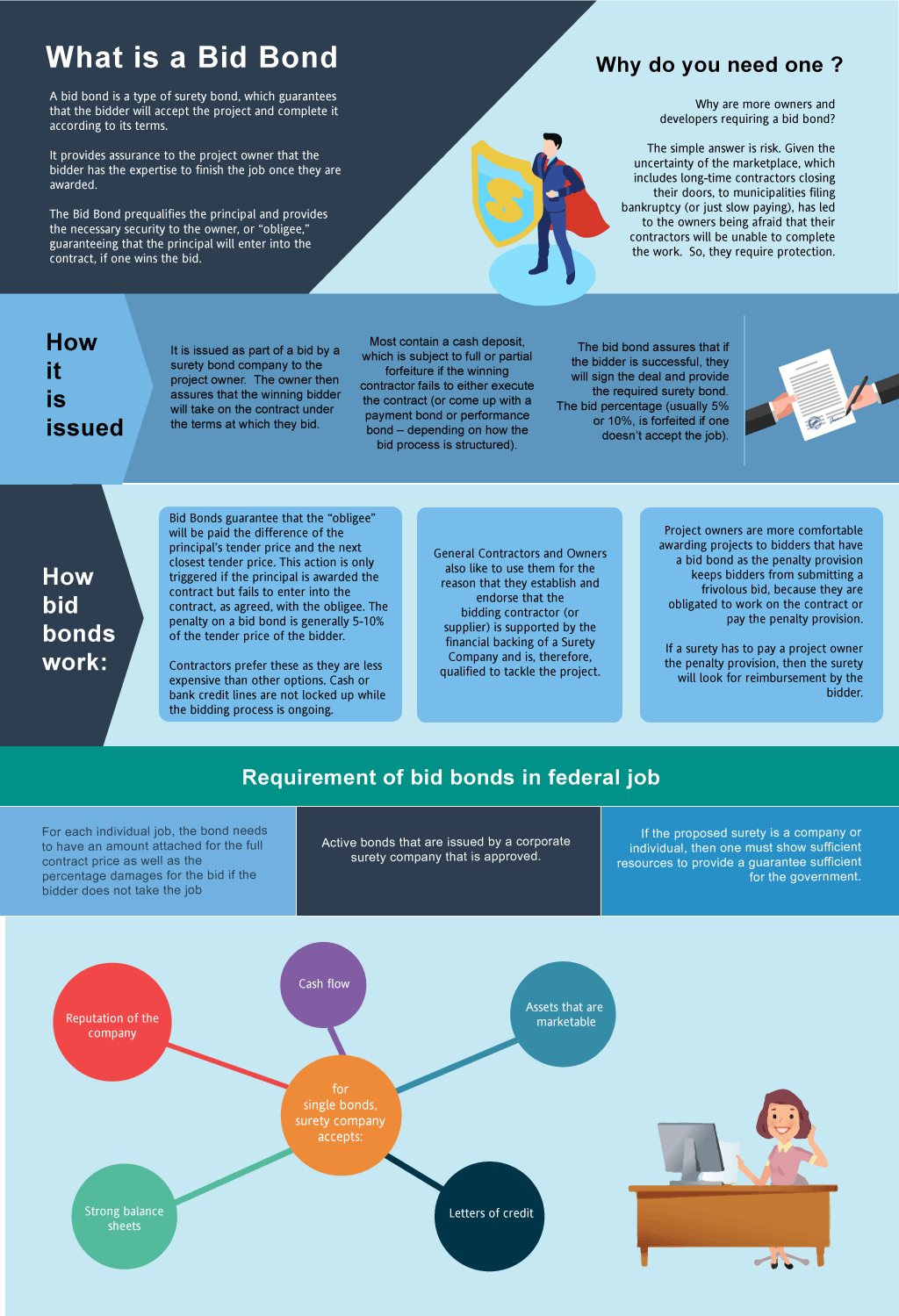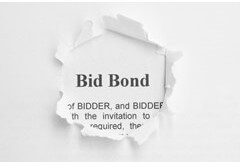You can now get a Bid Bond (almost) instantly. For Bids under $100,000, click here 
For all bids greater than $100,000, get our Express Application form:
Express Application (click to download form)
- Complete the form and email to [email protected].
- Be sure to include the RFQ/ITB (bid specs from the obligee).
What is a Bid Bond in Alabama?
A bid bond is a type of surety bond, which guarantees that the bidder will enter into the agreement and complete the contract according to its terms. It provides assurance to the project owner that the bidder has the ability and ability to complete the job once you are selected after winning the bidding process. The basic reason is that you need one in order to get the work. But the bigger question is why are more owners/developers requiring a bid bond? The answer is risk. Given the uncertainty of the marketplace, which includes long-time contractors closing shop, to municipalities filing bankruptcy (or just slow paying), has led to owners being afraid that their contractors will be unable finish the work. Thus, they require a some protection.
Just fill out our bond application here and email it to [email protected] - click here to get our Alabama Bid Bond Application

A bid bond is issued as part of a bid by a surety bond company to the project owner. The owner is then assures that the winning bidder will take on the contract under the terms at which they bid.
Most bid bonds contain a bid percentage (usually 5% or 10%, is forfeited if you don’t accept the job).

How much does a Bid Bond Cost in Alabama?
Swiftbonds does not charge for a surety bid bond (with two exceptions, see below). The reason that we don't charge for a bid bond is that we will charge for the P&P bond if you get the job. The cost of a contract bond can vary widely depending on the amount of coverage that is required (see below).
Two exceptions for bid bond charges:
1) We do charge for Overnight fees
2) We will charge you if there is NOT going to be a bond on the contract.
How much do bonds cost in AL?
Bond prices fluctuate based on the job size (that is, it's based on the cost of the underlying contract). The cost of a bond is estimated through a couple of back-of-the-envelope calculations. In general, the cost is approximately three percent (3%) for jobs under $800,000 and then the percentage is lower as the contract amount increases. We work diligently to find the lowest premiums possible in the state of Alabama. Please call us today at (913) 286-6501. We'll find you the very best rate possible for your maintenance bond or completion bond. Things that can affect this pricing are the perceived risk of the job, the financial position of the entity being bonded, plus other factors. See our Performance Bond Cost page for more.
| Bond Amount Needed | Fee |
| <$800,000 | 2-3% |
| >$800,000<$1,500,00 | 1.5-3% |
| >$1.500,000 | 1-3% |
These rates are for Merit clients, Standard rates are higher
How do I get a Bid Bond in Alabama?
We make it easy to get a contract bid bond. Just click here to get our Alabama Bid Bond Application. Fill it out and then email it and the Alabama bid specs/contract documents to [email protected] or fax to 855-433-4192.
You can also call us at (913) 286-6501. We fully review each application for bid bonds and then submit it to the surety that we believe will provide the best surety bond for your company. We have a very high success rate in getting our clients surety bonds at the very best rates possible.
Understanding Alabama Bid Bonds: Essential for Every Contractor

In our observation, Alabama bid bonds play a vital role in the state’s construction industry, offering assurance to project owners that contractors will adhere to the terms of their bids. These bonds serve as a financial guarantee that a contractor, once awarded the bid, will honor the contract terms and complete the project as specified. Without a bid bond, a contractor risks losing the job and even damaging their professional reputation. Therefore, securing this bond is a must for contractors in Alabama looking to bid on public or large private projects.
How to Locate the Right Bid Bond Provider Near You
From what we’ve seen, finding a reliable bid bond provider in Alabama is crucial for securing competitive construction projects. Fortunately, many surety companies across the state offer tailored bond services for contractors. Whether you're based in Birmingham, Mobile, or Huntsville, local providers often have deep knowledge of state regulations, making the process smoother. To find the best provider, we recommend researching companies with a strong history of providing bid bonds to contractors like yourself and asking for recommendations within your professional network.
Points to Remember When Looking for a Bid Bond Provider
When seeking the right bid bond provider, consider the following points:
- Experience and Reputation: Choose a provider with a proven track record in the surety bond industry. Look for companies with a reputation for providing high-quality services to contractors.
- Knowledge of Local Regulations: Make sure the provider understands Alabama’s state and local regulations, as this can streamline the bonding process.
- Customer Service: A provider with excellent customer service can guide you through the application process smoothly and answer any questions that may arise.
- Financial Strength of the Surety Company: It’s essential to work with a provider backed by a financially strong surety company that can reliably issue the bond and cover any claims.
- Flexibility in Services: Look for providers that offer customized bond solutions tailored to your specific needs, especially if your project requires unique conditions or circumstances.

Who Really Needs an Alabama Bid Bond?
In our experience, bid bonds are primarily required by contractors bidding on public works projects or larger private sector construction jobs. Project owners—whether they are government agencies or private developers—want assurance that bidders are financially stable and committed.
Who Needs Bid Bonds in Alabama?
In Alabama, the following types of contractors typically require bid bonds:
- Contractors bidding on public works projects
- Construction companies pursuing larger private sector jobs
- Small businesses looking to expand their contract opportunities
- Developers working with government agencies or large private clients
- Subcontractors needing to meet project owner requirements
We provide bid bonds in each of the following counties:
Autauga County
Baldwin County
Barbour County
Bibb County
Blount County
Bullock County
Butler County
Calhoun County
Chambers County
Cherokee County
Chilton County
Choctaw County
Clarke County
Clay County
Cleburne County
Coffee County
Colbert County
Conecuh County
Coosa County
Covington County
Crenshaw County
Cullman County
Dale County
Dallas County
DeKalb County
Elmore County
Escambia County
Etowah County
Fayette County
Franklin County
Geneva County
Greene County
Hale County
Henry County
Houston County
Jackson County
Jefferson County
Lamar County
Lauderdale County
Lawrence County
Lee County
Limestone County
Lowndes County
Macon County
Madison County
Marengo County
Marion County
Marshall County
Mobile County
Monroe County
Montgomery County
Morgan County
Perry County
Pickens County
Pike County
Randolph County
Russell County
St. Clair County
Shelby County
Sumter County
Talladega County
Tallapoosa County
Tuscaloosa County
Walker County
Washington County
Wilcox County
Winston County
And Cities:
Birmingham
Montgomery
Mobile
Huntsville
Tuscaloosa
Hoover
Dothan
Auburn
Decatur
See our Alaska bid bond page here.
More on Surety Bid Bonds https://swiftbonds.com/bid-bond/.
Top Considerations When Thinking About Bid Bonds
From our perspective, one of the most important things to keep in mind when considering a bid bond is the contractor’s financial standing. We’ve consistently found that bonding companies evaluate a contractor’s financial history, credit score, and project experience before issuing a bond. Contractors with stronger financials and experience will typically have an easier time obtaining bonds. Therefore, maintaining financial stability is crucial to the success of acquiring a bid bond.
Key Considerations for Bid Bonds
When evaluating bid bonds, we recommend keeping the following items in mind:
- Financial stability: Ensure your company has a strong financial background.
- Project experience: A history of successfully completed projects builds trust with bonding companies.
- Credit score: Maintain a good credit score, as this plays a significant role in the approval process.
- Relationship with bonding companies: Establish a good working relationship with a reliable surety provider for smoother applications.

A Closer Look at Surety Bid Bonds and Their Purpose
We’ve noticed that many contractors are unfamiliar with the intricacies of a surety bid bond. Essentially, a surety bid bond is a type of contract that involves three parties: the contractor (principal), the project owner (obligee), and the surety company. What we’ve learned is that this bond serves as a form of insurance, ensuring the project owner that the contractor will honor their bid or, if they fail to do so, that the surety company will cover any financial losses incurred by the owner. This mechanism fosters trust in the bidding process.
How Bid Bonds Work: The Process Explained
We’ve come to understand that the process of obtaining a bid bond is relatively straightforward, but still requires attention to detail. Contractors submit their bid proposal along with the bid bond, which acts as a financial guarantee. If awarded the project, the contractor must then enter into a contract and provide a performance bond. We’ve often observed that failure to secure a bid bond can disqualify a contractor from the bidding process, making it a crucial step in landing a job.
Applying for a Surety Bid Bond: What You Need to Know
In our professional life, we’ve seen firsthand how the bid bond application process works. Contractors will typically provide financial documentation, project history, and credit information to the surety company. We’ve found that surety companies conduct a thorough evaluation to ensure the contractor is capable of fulfilling the project requirements. It’s a process that may seem daunting at first, but with proper preparation, it becomes more manageable.
Step-by-Step Process to Apply for a Bid Bond
Here’s a simplified step-by-step process for applying for a bid bond:
- Prepare financial documents: Gather financial statements, credit reports, and project history.
- Submit an application: Apply with a surety company, either online or in person.
- Undergo evaluation: The surety will review your financials, credit, and project experience.
- Pay the bond premium: Once approved, pay a small percentage of the project cost as the bond premium.
- Receive the bond: Upon approval, receive the bond and submit it with your bid proposal.
Can You Be Denied a Bid Bond? Here’s What to Watch Out For
We’ve come to the conclusion that not all contractors are approved for bid bonds. Factors such as poor credit history, limited experience, or financial instability can lead to denial.
Reasons for Bid Bond Denial
From our experience, contractors may be denied a bid bond for the following reasons:
- Poor credit history: A low credit score can signal financial risk to the surety.
- Limited project experience: Lack of experience in similar projects can result in rejection.
- Financial instability: Companies with shaky financials may struggle to obtain a bond.
- Inadequate documentation: Failing to provide necessary financial and project records may result in denial.
How to Avoid Bid Bond Denial
To avoid bid bond denial, we recommend taking the following precautions:
- Ensure your credit score is in good standing.
- Provide a clear history of successfully completed projects.
- Maintain strong and stable financial records.
- Prepare all required documentation thoroughly before applying.
- Work with a trusted surety company to improve your chances of approval.
Understanding the Costs of Bid Bonds in Alabama
We’ve consistently observed that the price of a surety bid bond can vary depending on the project size and the contractor’s financial standing. In Alabama, contractors can generally expect to pay a small percentage of the total project value, often between 1% and 5%. What we’ve experienced is that this cost is a minor investment compared to the benefits, as securing a bid bond opens the door to bigger and more lucrative projects.

Final Thoughts on Alabama Bid Bonds
We’ve learned through experience that bid bonds are essential for contractors aiming to grow their business in Alabama’s competitive construction market. From the security they offer project owners to the opportunities they open up for contractors, bid bonds are a cornerstone of responsible and successful bidding. In our view, any contractor serious about their craft should prioritize obtaining the right bid bond and ensure they are prepared for every step of the application process.
